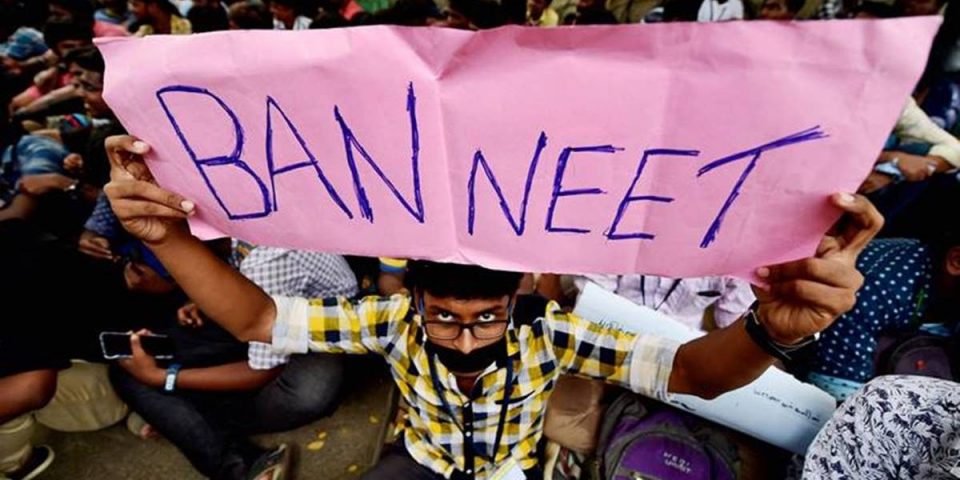
TN Governor has promised to send NEET Bill to President; what's next?
There are still fears the Bill will not get the President’s approval since all the previous constitutional hurdles remain

Tamil Nadu Governor RN Ravi recently assured Chief Minister MK Stalin that the anti-NEET Bill adopted by the Assembly would be forwarded to the Union government for presidential assent. However, there are still fears the Bill will not get the President’s approval, since it overrides a central law.
“Let the Governor first send it to the President. Then let’s look at the next course of action,” DMK Rajya Sabha member and senior advocate P Wilson tells The Federal.
The Assembly passed the Tamil Nadu Admission to Undergraduate Medical Degree Courses Bill, 2021, last September. The Bill attempts to bypass the National Eligibility cum Entrance Test (NEET) for medical students in the state, instead allowing admissions to be made based on marks obtained in Class XII, or Plus Two.
However, after keeping the Bill for 142 days, Ravi returned it to the Assembly for reconsideration. The Assembly soon passed the Bill a second time and sent it again to the Governor on February 8, 2022. The Governor’s assurance to forward it to the President came after Chief Minister MK Stalin’s intervention earlier this week.
Webinar: Does NEET-Medical violate the Federal spirit of India’s Constitution?
For years NEET has been a politically sensitive topic in Tamil Nadu, where more than a dozen students have allegedly died of suicide or stress because they were unable to clear it despite scoring good marks in Class XII. Most parties in the state, with the exception of the BJP, are against it.
What Justice Chandru said
Retired Madras High Court judge K Chandru believes this Bill will also be returned.
NEET was incorporated under Section 10D of the Centre’s Indian Medical Council (IMC) Act, he told The Federal. (The Act says: “There shall be conducted a uniform entrance examination to all medical educational institutions at the undergraduate level and postgraduate level through such designated authority in Hindi, English and such other languages and in such manner as may be prescribed…”).
“A state Act cannot override the Centre’s Act. So, it is unlikely to get the President’s assent. But the delay on the part of the Governor in sending the Bill to the President is unconstitutional,” Chandru said.
MP Wilson, who fought for OBC reservation in NEET’s All India Quota, believes that in case the President refuses to sign the Bill, the state has other “legal and constitutional” means at its disposal.
“The Governor is appointed to exercise his constitutional duty and his constitutional duty is to forward the Bill to the President. Let it be forwarded first. We will get the exemption through legal and constitutional means. We have a strategy for it,” he said.
Other advocates and DMK leaders also hold this opinion – though they choose to adopt a wait-and-watch approach for now.
What Stalin could have done
A retired judge who did not want to be named said the DMK government could simply have followed the recommendations the AK Rajan Committee, which it had constituted. The panel had found that NEET had led to a radical decrease in the enrolment of students from weaker socioeconomic backgrounds, to MBBS courses across government and self-financed medical colleges in Tamil Nadu.
“Whatever the government follows now is the second recommendation. The first recommendation was much simpler,” said the ex-judge.
According to the first recommendation, the government may take the stand that the words ‘University Education’ found in Entry 25 (i.e., education, including technical education, medical education and universities ) of List III (Concurrent List) of Constitution is a general provision; and ‘Regulation of Universities’, found in Entry 32 (i.e., incorporation, regulation and winding up of corporations and universities.) of List II (Schedule 7 of the Constitution – State List) is an exclusive state subject, which cannot be ignored, AK Rajan had written.
Also read: NEET: What Constitution says about role of Centre, States in education
Therefore, Article 254 – inconsistency between laws made by Parliament and laws made by the legislatures of state – cannot be involved to override Act 3/2007 (i.e. Tamil Nadu Admission in Professional Educational Institutions Act 2007, which abolished the Common Entrance Test in 2007), as it relates to Entry 32 of List II of the Constitution, he added.
“The admission to colleges affiliated under the Tamil Nadu MGR Medical University are governed by the Act 3 of 2007 (Tamil Nadu Admission in Professional Educational Institutions Act 2007), and hence admissions to those seats will be filled as per the provisions of that Act,” Rajan wrote.
‘Not fool-proof’
However, Chandru believes this route will also prove problematic. “There is a Supreme Court judgment from 1984, in a case related to the University in Tamil Nadu. That judgment goes against this proceeding as well. This process is much more complicated and even this procedure cannot override the Indian Medical Council Act,” Chandru told The Federal.
Recalling a precedent, the judge said a Bill to abolish the CET (Common Entrance Test) for state board students, passed by the J Jayalalithaa government in 2006 (Tamil Nadu Admission in Professional Educational Institutions Act 2006), was struck down. But the Bill which eventually became the Tamil Nadu Admission in Professional Educational Institutions Act, 2007, and which had the same objective, received presidential assent. That Bill was formulated on the recommendations of an expert committee and was passed by the M Karunanidhi government.

